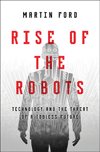Rise of the Robots: Technology and the Threat of a Jobless Future by Martin Ford
Book review: Rise of the Robots: Technology and the Threat of a Jobless FutureMartin Ford's solution to the threat posed to jobs by robots is logical, but flawed, says Matthew Partridge.

Get the latest financial news, insights and expert analysis from our award-winning MoneyWeek team, to help you understand what really matters when it comes to your finances.
You are now subscribed
Your newsletter sign-up was successful
Want to add more newsletters?

Published by Oneworld Publications, £18.99
Martin Ford's Rise of the Robots: Technology and the Threat of a Jobless Future is one of several books to make the Financial Times' long list for its Business Book of the Year award.
Try 6 free issues of MoneyWeek today
Get unparalleled financial insight, analysis and expert opinion you can profit from.

Sign up to Money Morning
Don't miss the latest investment and personal finances news, market analysis, plus money-saving tips with our free twice-daily newsletter
Don't miss the latest investment and personal finances news, market analysis, plus money-saving tips with our free twice-daily newsletter
Ford looks at how technology and automation is affecting the type and quantity of jobs available, and will continue to do so. According to Ford, what makes this "robot revolution" different from past technological shifts such as the agricultural and industrial revolutions is that these only affected one sector of the economy, allowing the rest of society to benefit. But changes in IT and robotics threaten the jobs of everyone from high-paid lawyers on Wall Street to Asian textile workers.
"It is easy to dismiss his prognosis as the rantings of a latter-day Luddite," notes Edward Luce in the FT. However, "unlike his first book, which was based on a thought experiment about tomorrow's world", Rise of the Robots "is grounded in today's economy" and "is well researched and disturbingly persuasive". This is "both a humbling book and, in the best sense, a humble one", agrees Barbara Ehrenreich in The New York Times. Ford "never succumbs to the obvious temptation to overdramatiseor exaggerate".
However, the book's real message isn't about "the imminent triumph of soulless automatons", says Andrew Leonard of the LA Times. It's more about the fact that "the relentless drive by capital to cut costs and boost profits is threatening to destroy the wellspring of economic growth that capitalism requires... when there are no jobs for humans, there will be no consumers with the disposable income to buy the products being produced so efficiently by robots".
Worst of all, while "Henry Ford understood this when he paid his workers high enough wages to buy his cars", the business leaders of today "appear to have forgotten the lesson".Of course, just because the author has correctly identified the problem doesn't mean he's come up with the answer.
Ford suggests a citizens' income a state-paid income for all citizens, employed or otherwise as a solution. "There is logic to his remedy but not much realism," says Luce. "It's hard to see how this will happen," agrees Leonard, especiallygiven "our broken political system."
As a result, says Bryan Appleyard in The Sunday Times, "for the moment there is no hope that the rise of the robots will not be accompanied by the fall of the humans". Perhaps but only as a first step towards a solution, "Ford's may be the best the feeble human mind can come up with at the moment", says Ehrenreich.
Rise of the Robots: Technology and the Threat of a Jobless Future, by Martin Ford. Published by Oneworld Publications (£18.99).//
// ]]>
Get the latest financial news, insights and expert analysis from our award-winning MoneyWeek team, to help you understand what really matters when it comes to your finances.

-
 Has the market misjudged Relx?
Has the market misjudged Relx?Relx shares fell on fears that AI was about to eat its lunch, but the firm remains well placed to thrive
-
 Dario Amodei: The AI boss in a showdown with Trump
Dario Amodei: The AI boss in a showdown with TrumpAnthropic’s CEO Dario Amodei was on an extraordinary upward trajectory when he found himself on the wrong side of the American president. He is about to be severely tested.